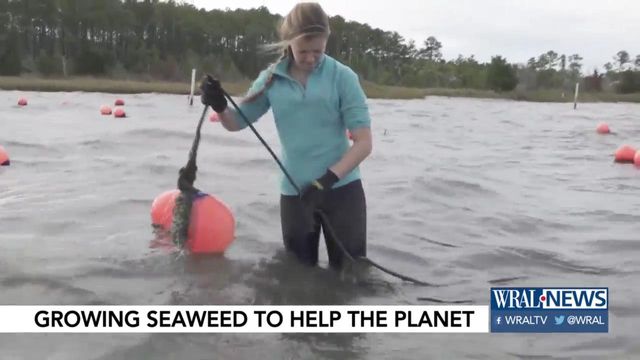UNC undergrads hope seaweed can help save the planet
A UNC senior has started a business based on her idea to combat climate change: Seaweed, fed to cows to cut down on methane emissions.
Posted — UpdatedEliza Harrison was like any other undergrad at the University of North Carolina at Chapel Hill when she went to a conference for innovation and entrepreneurs a couple of years ago hoping to meet some of her heroes and make connections for the future. That's when she heard a speech by Bren Smith, the founder of Greenwave, that would change the direction of her life.
"At one point during his presentation, he mentioned the fact that seaweed is five times more effective at carbon removal than any land-based plant," she said.
Her obsession with seaweed began at that moment.
"I really fell in love with the plant," Harrison said.
It's that idea that led her to form Phyta, a company with plans to grow and sell seaweed as a way to fight climate change.
Seaweed has many benefits for the environment ranging from creating cleaner plastics to food for livestock. Research shows seaweed added as a supplement to the food that cows eat can reduce their methane emissions by up to 99 percent. Animal digestive gas accounts for 25 percent of the planet's total methane emissions.
"I've always been very interested in climate change and have, within that context, struggled as to how I can, as an individual, actually make a difference whether in the energy sector and water conservation," she said.
She saw this business as her chance. Harrison, who is now a senior at UNC pursuing a degree in Environmental Health Science, recruited two of her classmates to join the company and started working on ideas for how to bring the idea to life. She learned no one was really growing seaweed on the east coast in warm water.
"There was a lot of research that we put into figuring out what materials those species grow on and what the best ways to grow those species are," she said.
They managed to find the right formula and have started a small pilot farm just off the North Carolina coast.
"It's really impressive how accomplished they are for how young they are," said Dr. Kurt Ribisl, who has served as an academic advisor and mentor to Phyta. "I don't know many people who are 21 and are a CEO. They have already filed a provisional patent."
The idea has the attention of people around the world. Phyta was selected as a global finalist for the Hult Prize where the ladies got a chance to present their business concept in front of world leaders at the United Nations.
"That was crazy," said Phyta co-founder Emily Kian. "I would say that is one of the most surreal experiences of my life."
"It's inspiring," said Sheryl Waddell, director of the Innovate Carolina Global Network. "Every day that I come to work and work with students like Emily and Eliza, it's inspiring because they have so much passion, so much dedication."
Harrison and Kian plan to harvest their first seaweed in the next few months and eventually would like to open seaweed farms up and down the coast. The big goal is to get people who may not care about climate change to start caring about the business seaweed can create.
"I think I personally believe that entrepreneurship and social entrepreneurship can be a really good way to bridge that gap," said Kian. "Because you find a lot of people are more interested when they can see that something that's fighting climate change is also bringing in money."
• Credits
Copyright 2024 by Capitol Broadcasting Company. All rights reserved. This material may not be published, broadcast, rewritten or redistributed.





